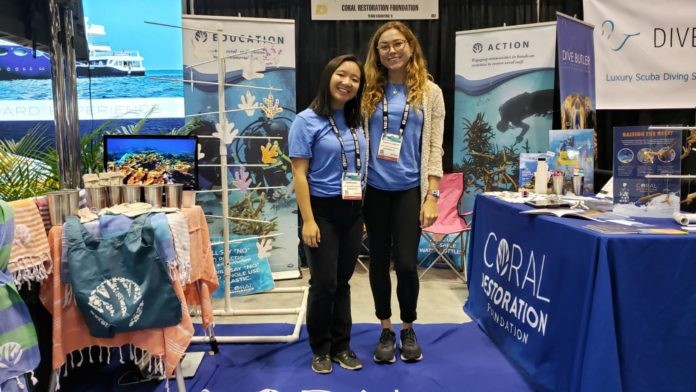We stopped by the Coral Restoration Foundation booth at DEMA Show 2019 to find out more about their efforts to replenish Florida’s reefs and raise awareness about reef health worldwide.
While they currently foster eleven species, the main focus of CRF’s efforts have been the staghorn and elkhorn porous corals which are critical players in the building of reefs, and 90% of the Florida populations have been lost since the 1980s. At this point, CRF has propagated over 300 genotypes and are starting to expand into boulder corals, which is a huge step forward since the key to any robust ecosystem is genetic biodiversity.
The process is fascinating — the young coral is hung from a CRF Coral Tree where it can grow in relatively safe conditions until it’s about the size of a volleyball. At that point it’s ready to be outplanted onto a living reef using a marine epoxy to keep it in place until it’s a fully-integrated denizen of its new environment. After only two years, outplanted coral have been observed beginning to spawn on their own, which means the reef is on its way to restoration.
In order to do the important work they do, CRF relies on donations of time and money. They also partner with all kinds of organizations for all kinds of purposes. CRF collaborates on research, education, and conservation programs with universities, government agencies, NGOs, the Georgia Aquarium and other local conservation groups.
Citizen-scientist volunteers can join them for a day, spending the morning learning about reefs and how CRF cultivates them, then heading out for two tanks in the open water to help clean some of the 500 Coral Trees in one of their seven nurseries, or to outplant mature coral. Longer programs are available as well — after a three-week training program, volunteers with gear and insurance are welcome aboard any of CRF’s six-pack boats. They even offer PADI Coral Restoration certifications.
If you don’t have time, but do have money, check out their donation options and merch store on their website. While you’re there, sign up for their newsletter so you can stay up to date on their important work in reef conservation.

